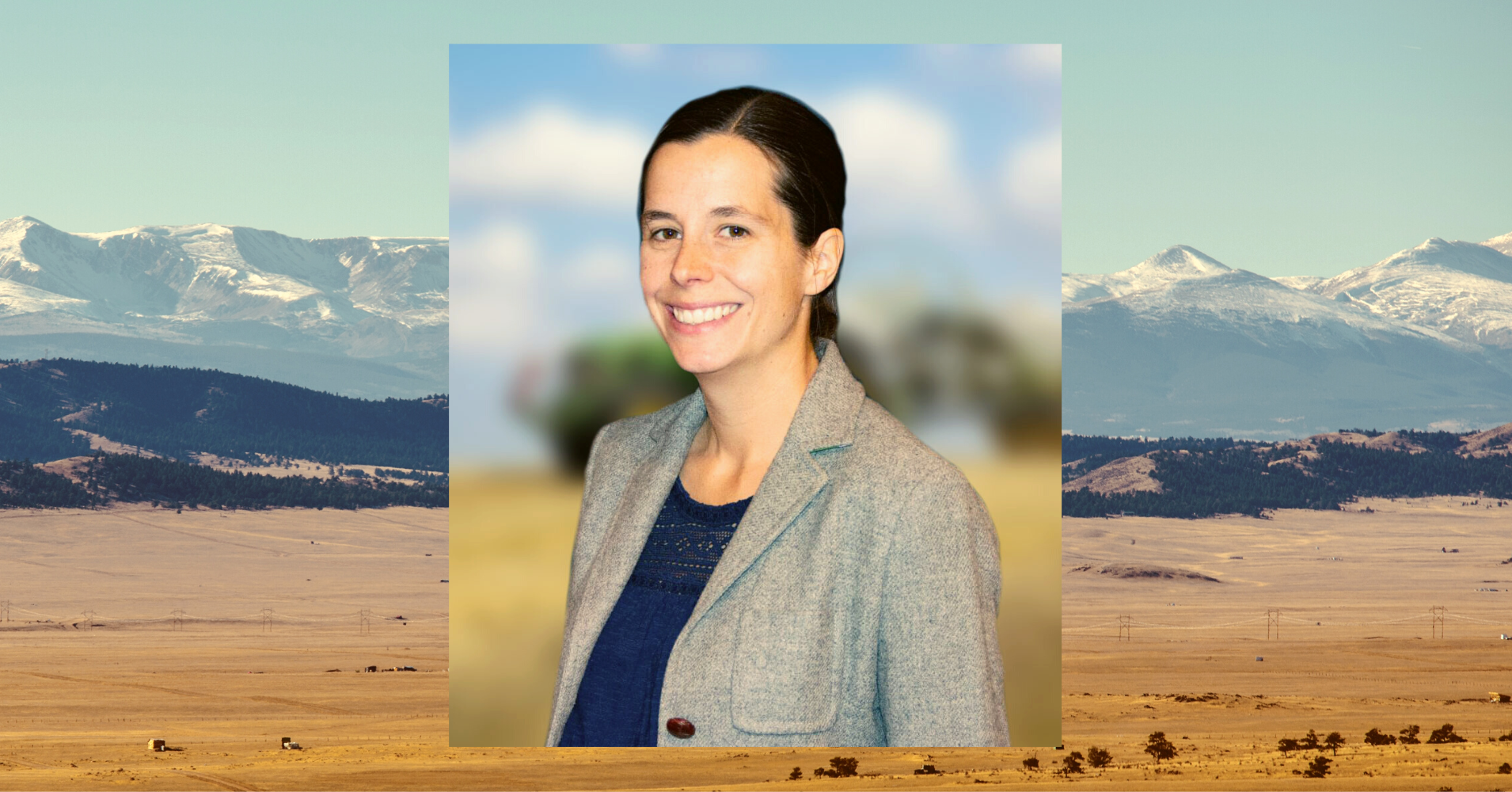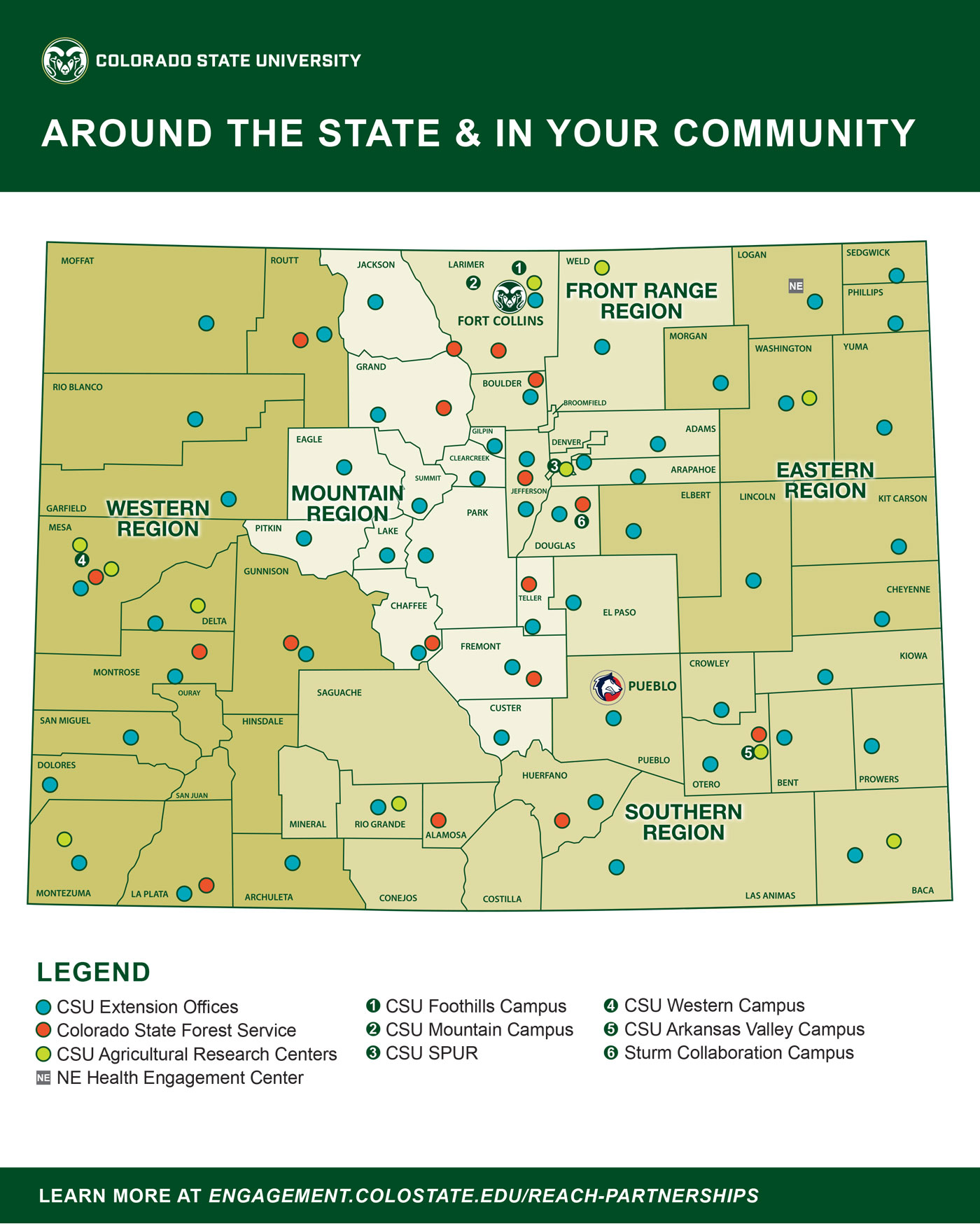Q&A with Libby Christensen: Rural Initiative Statewide Food and Agriculture Specialist

This Q&A is part of a continuing series introducing the newly hired specialists who are part of the CSU Office of Engagement and Extension's Rural Initiative.
Libby Christensen is one of 14 new Rural Initiative specialists with CSU Extension. Christensen will be focusing on addressing system-wide challenges faced by diverse stakeholders across Colorado’s food and agricultural economies.
Christensen earned her M.S. in community and regional development, as well as her Ph.D. in geography, from the University of California, Davis.
A couple months into her new position, Christensen shared what excites her about the job, how her background positions her to make an impact in the community, and what community needs she hopes to address through her work.
“Folks are trying to come up with strategies and solutions for that immediate problem or challenge, and my role is really to think about, ‘How do we aggregate or identify those challenges that are being seen across the state and think about more system-level solutions or strategies to address those problems?’”
– Libby Christensen, CSU Extension Statewide Food and Ag Specialist
“I would say what most excites me about this role is the opportunity to expand capacity across rural Colorado. I was fortunate enough to have an opportunity to be a county agent for a number of years in Routt County and one of the things that was so hard was, I always wanted to say ‘Yes’ when community partners would come to me with an idea, but there were so many obligations and expectations from my community through Extension that I didn’t always have the bandwidth to say ‘Yes’ and explore those things.
We in Extension are also charged with creating, connecting and educating people and I think the folks in our communities and county offices have done an excellent job really focusing on that education and connection. I’m so excited about this position because we get the opportunity to focus on creating and reflecting back on some of those questions and issues that are a little bit bigger and thinking about how do we connect that to resources on campus or beyond.”
“My background and professional pathway has been really shaped by the land-grant university mission, with the purpose to provide readily available, research-based programs and educational resources with the goal of improving the lives of individuals, families and their communities. That has been the consistency across my career path.
I intentionally pursued interdisciplinary fields of research and study because it lent me the flexibility and freedom I needed to work with community and have them identify research questions, or topics or issues, that they were passionate about. I could then go out and pursue tools or information or financial resources to help them explore, better understand and come up with strategies and solutions that they found meaningful to the problems that they identified.
The lens and the approach that I’ve taken in that space has been through agriculture and food. From working at a small-scale pig farm in North Carolina, or an organic-certifying agency or a produce distribution company, each of these has given me a little bit more insight and opportunity to work with folks on the ground who are trying to come up with day-to-day solutions. The University home has allowed me to try and think about system-wide solutions and strategies to the challenges they’re facing.”
“My position is a little bit unique because I am a statewide specialist, that allows me to come at this question of, ‘What community needs am I hoping to address?’ a little bit differently than some of the other regional specialists.
And fundamentally at that is the question of scale. So, I have my Ph.D. in geography and so scale is always front of thought, and one of the things from my experiences in the county offices and working with folks on the ground, is that so many of our daily lives are caught up with the immediate needs. Be it childcare, finding enough food to help you get through the week, or addressing a pest that might be plaguing your field or operation. And so, folks are trying to come up with strategies and solutions for that immediate problem or challenge, and my role is really think about how do we aggregate or identify those challenges that are being seen across the state and think about more system-level solutions or strategies to address those problems.
I don’t necessarily know which exact needs I’m going to identify, it’s more thinking about how do we work with communities and individuals that are having their lived experience and then how do we see the connections and linkages across those spaces where it would be appropriate for the Office of Engagement and Extension to come in and provide some connection, linkage and support, either through resources on campus, federal resources, or foundational support that can make those lives better.”
“Collaboration is at the heart of solving any challenge, any big system issues that are facing society. That being said, how do I seek to foster it? I think there are a number of different strategies.
One is really valuing and appreciating the lived experience of individuals on the ground and not underestimating their expertise and knowledge that they’re bringing to the situation at hand.
And then, as I said earlier, there’s this issue of scale. So, lots of folks don’t have the luxury to think at that next-level scale, or they don’t really have the desire to, and so I think that’s a place where collaboration, and bringing in some additional partners that are outside that lived experience, can shed some light and perspective on the challenge at hand.
So, that’s really been my pursuit, is valuing lived experience, pursuing tools and resources that allow individuals to create research-based, objective responses to those challenges and issues and finding somebody who can help solve those problems.
And so creating the linkages across those different pools of individuals is how I have approached coming up and addressing some of these wicked challenges.”
“My focus area is on agriculture and food. For any significant scale of operation you need space. And that space is created by the absence of humans. So, that is happening in rural communities.
Rural communities are well-positioned to utilize landscapes to grow food and fiber and resources that can then be transported to urban settings.
So, food and agriculture is a really fascinating way that we can see immediate linkages between urban and rural residents and build bridges across those because everyone eats. So, it’s a coming to the table, a conversation starter, that allows us to break down these historical perceived barriers between rural and urban.
Colorado has such a beautiful rich, diverse, rural landscape that allows us to produce a plethora of different agricultural commodities that could be better utilized in our urban areas and better valued and respected.
I think there is a general appreciation for open spaces in the state of Colorado and we’re very fortunate for that. We also have a lot of brand identity outside of the state that people really value and respect the brand of Colorado, but one of my roles is trying to think about how do we increase the consumption and connection of products and resources that are from rural communities consumed in urban places.”
